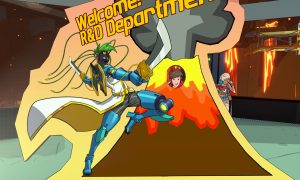It’s rare for a game to come out and turn its genre on its head. Every once in awhile, though, a title comes along and flips traditional norms, taking a unique approach to established conventions.
Klaus is one of those games.
A platformer at its core, Klaus feels different from its peers due to its story driven approach. Whereas an emphasis on simple mechanics and smart level design usually serve as the lifeblood of platformers, Klaus takes its gameplay one step further by making every aspect of the game focus on a larger narrative. Everything from the checkpoints, to the in-game objects that Klaus interacts with, and even the players themselves contribute to form a refreshing experience. Klaus is a solid platformer that, while not without its faults, will stick with you long after you’ve finished playing.
The story begins with the title character awakening in a basement with no memory of who he is or how he got there. The only clue to his origin is the word Klaus written on his arm. Assuming that moniker to be his name, Klaus embarks on a quest to discover his identity and unravel the mysterious circumstances that led to his amnesia. Along the way are plenty of interesting plot twists and gripping, existential moments, but to give them away would really be a disservice to the entertaining presentation of the game.

The story-based approach to gameplay is where Klaus really differentiates itself, though. Every object within the game has some degree of correlation to Klaus’ backstory. For example, Klaus’ discovery of his ability to hack computers eventually factors into the revelation that he is a programmer. A later discovery also informs the player that checkpoints actually spit out a clone when Klaus dies during gameplay. These are just a few examples of the interesting developments throughout the narrative that really helps to drive home the larger experience.
One of Klaus’ most fun design elements is in how the player gets involved. Throughout the roughly eight hour campaign, Klaus expresses his thoughts using on-screen dialogue written along the walls. However, it soon becomes clear that Klaus is aware of the player’s presence, and that much of his inner monologue is actually a way of communicating with you. This leads to some fantastic gameplay twists, such as when Klaus decides to ignore the player and act freely of the player’s control. Not unlike the involving gameplay approaches of Tearaway or Eternal Darkness, this self-aware experience is one where the player does more than control the hero — they are an active participant.
Early on in Klaus’ quest, he encounters a hulking brute that shares many of the same physical traits. Named K1, this larger yet dumber version of Klaus also gets wrapped up in the plot as the pair team up to collectively solve gameplay obstacles. Klaus is smarter and more nimble, but K1 is able to punch through barriers and use his ripped T-shirt like a cape to glide over long distances. The player is able to switch between Klaus and K1 at will, and puzzles often revolve around picking the right character for the job, or choosing to control both characters simultaneously.

Of all of Klaus’ interesting gameplay hooks, though, the most gripping come in the form of side missions. Acquired by finding a hidden orb in each stage, these mini levels each feature their own gameplay twist related to a memory belonging to Klaus. An early stage in which Klaus is only able to move left triggers a memory that Klaus is left-handed, for example, while another stage in which the player controls two parallel Klauses causes the hero to remember that he had a brother that died. Not only do these memory stages usurp traditional platforming, they are some of the best and most memorable moments in the entire game.
However, with so many mechanics at play at once, putting your thoughts into action is not always the simplest task. Aside from Klaus and K1, the player is also able to move platforms and open doors using the touchpad on the DualShock 4. When used during slow-paced gameplay, it’s easy to move Klaus and K1 onto nearby platforms and control their surroundings. Moments in which the heroes and their surroundings need to be controlled simultaneously, however, make it difficult to keep track of the involved characters. Add in the fact that Klaus and K1 play differently, despite the ability to control both at once, and the inclusion of environment manipulation through touch controls feels like overload. There was never a situation where the control hurdle caused repeated frustration, but some of the more time-sensitive moments are often met with numerous failed attempts due to an inability to mentally keep up.
Character death and checkpoint restarts will come quite frequently, as well. Thankfully, Klaus features a satisfying difficulty curve that eases players in. Early chapters start off slow, keeping gameplay demands simple as players learn the basic mechanics. The difficulty soon ramps up, though, and before long, the platforming begins to offer a rewarding level of challenge that will have average players dying several times per stage. The gameplay never gets to Super Meat Boy levels of overall difficulty, but Klaus boasts an impressive difficulty progression as the game continues.

Klaus is an enthralling adventure that boasts a clever narrative and some great gameplay twists. The platforming works well, and is coupled with some excellent moments that subvert expectations thanks to wonderfully designed side missions. The controls and touchpad reliance often make Klaus a bit too much to handle at once, but a satisfying difficulty curve evens it out. Klaus throws the platforming playbook out the window and is one of the most unique games I have ever played.
Gaming Trend's resident amiibo collector, Matt's a lifelong gamer with a soft spot for Nintendo. As a new father, Matt often struggles to stay as involved as he has been in years past but can always be counted on to come back for some engaging geeky conversations. A resident of Philadelphia, he is currently working on building up his Man Cave with all things Marvel, Star Wars, and Video Games. As an old-school gamer, Matt firmly stands by his belief that gameplay will always be more appealing than story.

Klaus is a thought-provoking platformer that usurps expectations and will stick with you long after you’ve finished playing.
PROS
- Unique story-based approach to gameplay
- Hidden side missions are fantastic
- Great difficulty curve
CONS
- Controlling too much at once can cause brain processing overload

 Buy Now
Buy Now
 Buy Now
Buy Now
 Buy Now
Buy Now
 Buy Now
Buy Now
 Buy Now
Buy Now
 Buy Now
Buy Now















